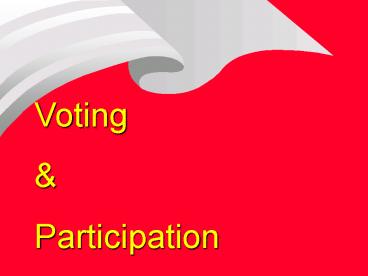PowerPoint Presentation - Voting - PowerPoint PPT Presentation
1 / 31
Title:
PowerPoint Presentation - Voting
Description:
Oregon Mail-In Vote. Texas Two-Week Vote. Motor ... heart of democratic elections. ... groups have significant impact on elections: 5. Religion. 6. Gender ... – PowerPoint PPT presentation
Number of Views:69
Avg rating:3.0/5.0
Title: PowerPoint Presentation - Voting
1
Voting Participation
2
Characteristics which account for Voter Turnout
Socioeconomic
Demographic
Psychological
Voter Turnout
3
Socioeconomic Characteristics
Education increases ones capacity for
understanding complex and intangible subjects
such as politics, as well as encouraging the
ethic of civic responsibility.
4
Socioeconomic Characteristics
Family Income Turnout rises sharply from low to
middle income levels.
5
Socioeconomic Characteristics
Occupational Status Turnout rises sharply from
unskilled laborers to white collar or
professional jobs.
6
Demographic Characteristics
Race Ethnicity The lower average education and
incomes of racial and ethnic groups reduce the
likelihood that members of these groups will vote.
7
Demographic Characteristics
Age As people grow older, they gain knowledge and
other resources that make participation easier.
Community ties such as home ownership, marriage,
and children develop with age.
8
Demographic Characteristics
Gender Since the Womens Movement in the 1960,
women started to vote at the same rate as men.
Since 1984, white women have often voted at a
slightly higher rate than white men in
presidential elections.
9
Psychological Characteristics
Party Identification People who identify strongly
with one of the political parties are more likely
to show up at the polls on Election Day than weak
identifiers or independents.
10
Psychological Characteristics
Efficacy The feeling that one can have an effect
on politics and political decision makers also
motivates people to vote. Those who feel
ineffective view voting and other types of
political participation as wasted efforts.
11
Psychological Characteristics
Interest in Politics People who have an interest
in politics and follow it in newspapers and
magazines are also more likely to vote than those
who are not interested and who do not follow
politics in the print media.
12
Psychological Characteristics
Interest in Politics Those who read about
politics learn a good deal those who only watch
television do not.
13
Psychological Characteristics
Group Consciousness Identification with ones
social group (for instance, black consciousness,
gender groups, issues groups, etc.) are more
likely to participate in elections.
14
Psychological Characteristics
Trust in Government Ones attitude of trust
toward government seems to have little or no
influence on voter turnout.
15
Geographic Characteristics
16
Registration Laws
The more difficult and time consuming it is to
vote, the less likely people are to do so.
1. Almost all industrial democracies have
automatic voter registration. 2. Many
industrialized democracies have a system of
compulsory voting.
17
Registration in the United States
Closing Date Poll Taxes Literacy
Tests Intimidation
18
Campaign Contacts
Efforts to mobilize voters Party Campaigns
(Soft Money) Nonpartisan Interest Groups Oregon
Mail-In Vote Government Strategies Oregon
Mail-In Vote Texas Two-Week Vote Motor Voter Act
of 1993
19
Attempts to Increase Voter Turnout
20
POLITICAL ACTIVISTS
Complete Inactives
21
(No Transcript)
22
How Voters Make Choices
Party Identification Candidate
Characteristics Issues Changes Over Time
Social Groups
23
Party Identification
This is more than an emotional or psychological
attachments it is a way in which people think of
themselves and an influence on how they behave.
Perceptual Screens are used to judge candidates.
24
Candidate Characteristics
The candidates personalities, experiences, past
records, and even their physical appearances make
up this set of voting influences.
Some voters are influenced by irrational
prejudices.
25
Issues
Issues lie at the heart of democratic elections.
Although few people lack the knowledge of public
policy, issues still do affect campaigns and
elections.
Retrospective Issue Voting - deciding how to vote
on past policy outcomes.
Prospective Issue Voting - deciding how to vote
on the basis of a candidates likely future
policies.
26
Issues
Retrospective Issue Voting - deciding how to vote
on past policy outcomes.
Sociotropic Voters - People who vote on the basis
of their communitys economic interests, rather
than their personal economic interests
27
Prospective Issue Voting - deciding how to vote
on the basis of a candidates likely future
policies.
In order for an issue to play any role in a
voters decision, the voter must 1. be aware
of the issue and have an opinion on it 2. have
some idea about what the government is
currently doing on that issue 3. see a
difference between the policies the two
candidates propose in response to the issue.
28
Researchers suggest the following criteria for
issue voting. An issue can influence someones
vote if the voter 1. can place himself/herself
on the scale 2. can place both candidates on
the scale 3. sees a difference between the
candidates 4. correctly places Democratic
candidates to the left of Republican
candidates.
3
4
1
2
5
6
7
Government should ensure jobs and good living
standard
Government should let each person go ahead
29
Easy Issues Simple issues that allow voters to
make quick, emotional decisions without much
information. (E.g. crime, abortion, drugs.)
Hard Issues Complicated issues that require
voters to have information about the policy and
to spend time considering their choices. (E.g.
federal budget, foreign policy, health care.)
30
Changes Over Time
The relative importance of party identification,
candidate characteristics, and issues may change
from one election to the next.
Factor which may change voter decisions 1.
Dramatic events such as war or recession 2.
Issue campaigns and ideological conflicts 3.
Campaigns which focus on character or scandal.
31
Social Groups
The following social groups have significant
impact on elections
1. Family Income 2. Education 3. Union
Household 4. Race/Ethnicity
5. Religion 6. Gender 7. Ideology































